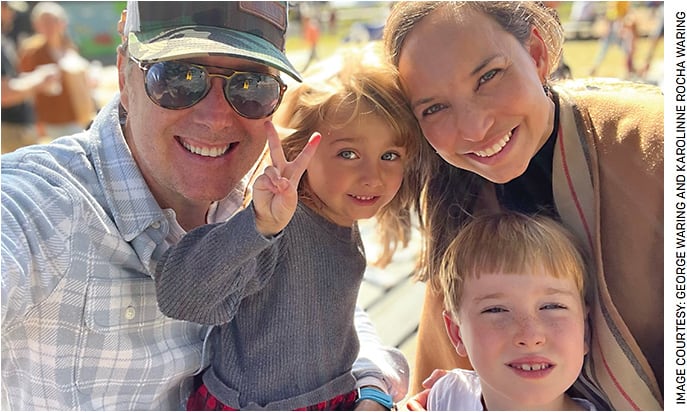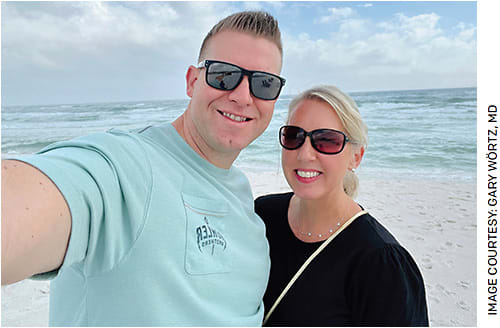MARRYING FAMILY LIFE WITH PROFESSIONAL LIFE
BY GEORGE O. WARING IV, MD, AND KAROLINNE MAIA ROCHA, MD, PHD
A March 2022 survey conducted by CHG Healthcare found that 123 of 145 new physicians out of residency for 2-3 years (about 85%) identified work-life balance as the most important factor in choosing their first job. It was even more important than salary, which came in fifth.
We’re not surprised.
As ophthalmic surgeons who are married with two small children, ages 4 and 7, we know well the importance — and challenges — of balancing the needs and responsibilities of our respective practices with those of our family. It’s no small task, but we have learned that mastering three key skills — setting priorities, planning and establishing boundaries — goes a long way toward helping us achieve a lifestyle that works for us, our family and our careers.
It was at the 2007 ARVO meeting, where we were each presenting the results of our own research, that our paths crossed for the first time. We were married 4 years later, in 2011, and went on to have two wonderful children, Maia, now age 4, and George V, now 7.
While George leads an active private practice specializing in refractive cornea, lens and cataract, Karolinne teaches and handles a heavy caseload of cataract and other refractive surgeries for an academic center as well as for a separate tertiary care referral program.
It’s wonderful to have so much in common professionally, but it can also be challenging to balance our work life with our personal and family life. Our daily schedules often overlap, and we also travel to many of the same professional meetings and collaborate on much of our research.
Fortunately, we have found a three-pronged strategy for overcoming the obstacles that can stand in the way of achieving the work/life balance that eludes so many of us ophthalmologists.
A THREE-PRONGED APPROACH
Family first
The first prong of that strategy is setting priorities. As we’re sure you can relate, our work doesn’t always run on a nice, neat, 9-to-5 schedule. In fact, it hardly ever does.
In addition to seeing patients and performing surgery, there are physical meetings to attend, phone calls to make and return, emails to read and answer and, more than ever, virtual meetings. Days can be quite long, indeed.
That said, once our workday is over, it’s over. We make protecting our family time our top priority; eg, we do our very best to minimize checking for work-related phone messages or email on our “own time.”
This is especially true on weekends, when it is important for us to be fully present in the moment while spending quality time with the kids going for walks, playing games, going to church and doing other things as a family.
Us second (and first and third)
Prioritizing time with each other as a couple is also important. We take hot yoga classes two or three times a week and do other activities centered on health and wellness that keep us connected as a couple. We also have date nights, usually at the end of the week, at least two or three times a month. We’ll take two or three hours to go out for dinner and then come home in time to tuck our children in at bedtime.
Me third (and first and second)
Finally, we make it a priority for each of us to pursue our own interests. For instance, when it comes to our fitness, George typically works out with a personal trainer for an hour before work after he drives our son to school early in the morning, while Karolinne often picks our kids up from school and works out in the afternoon.
Whether it’s spending time on a hobby or with friends, we believe it’s important to get some time to yourself in order to give your best to your spouse, your family and your work. As a result, wherever possible, we have to put our mental and physical health and wellness first to have a healthy family and work.
PLANNING FOR SUCCESS
Of course, setting priorities is one thing; following through on them is another. Especially since we have two small children and so much of our work revolves around the same demands, planning is a must for us to make our priorities a reality. For example, since we practice the same subspecialties, we attend many of the same conferences.
As a result, we often “divide and conquer.” One of us, for example, will go to and come home from our specialty meetings a day earlier than the other, and vice versa. During the week, we tag team with the kids.
We’re also fortunate to have great help with childcare. We’ve had the same daytime nanny since the kids were babies; she really is like part of the family. Karolinne’s mother also sometimes helps watch the kids when we’re both traveling for work.
Bottom line: It takes planning and coordination to make sure childcare is covered and to minimize the amount of time that we’re away, but it’s great to know that we have people we can trust watching over the kids while we’re away.
SETTING BOUNDARIES: LEARN HOW TO SAY “NO”
Lastly, we have also learned how to prioritize our professional responsibilities and to remain mindful of not over extending ourselves. We do this so that we can put our best effort forward on the responsibilities that we do accept, and also to ensure that we maintain the appropriate bandwidths to balance ourselves, our family and our work.

MAKE IT WORK FOR YOU
Like beauty, work-life balance is in the eye of the beholder. Your vision of the ideal work-life balance may not look the same as ours. But the beauty of setting priorities, careful planning and establishing boundaries is that they can tip the scales in favor of your work life and your family life. OM
HOW TO KEEP YOUR PROFESSIONAL LIFE IN ITS PLACE
BY GARY WÖRTZ, MD
There is an old saying: “If you don’t know where you’re going, any road will take you there.” To the majority of the ophthalmologists reading this, you need no direction on being goal oriented, nor do you need advice on the benefits of delayed gratification. The majority of us were willing to make the necessary sacrifices in order to achieve our dreams. In fact, many of us have made working hard such a habit that relaxing seems foreign, even dangerous. Contentment seems like a trap, as it may get in the way of future greatness.
Saying no to opportunities feels similarly uncomfortable. However, when we committed to becoming high achievers, it was not supposed to consume us. It was a means to an end. Now, many of us, myself included, can feel like “prisoners of our own design” to borrow a phrase from the Eagles’ “Hotel California.” We have created an ever-accelerating carousel, and there is no easy way to slow it down, let alone stop. However, I think this paradigm keeps many of us trapped.
Exploring the concept of work-life balance is an important factor in our ability to continue finding fulfillment in our amazing, yet demanding profession.
THREE ESSENTIAL QUESTIONS
If you know that your life is out of balance, it is important to be honest about that. Recognize that you alone are 100% responsible for your past, your present and your future. However, just because you are responsible doesn’t mean everything is your fault. Bad things happen that are out of your control, but you are responsible for how you respond to your circumstances and move forward. If you are having trouble with this concept, I would strongly recommend reading “Rewire Your Mindset” by Brian Keane.
Your life is within your control to change if you recognize your role in your own situation. It starts by asking three clarifying questions:
- What do I want?
- What am I doing?
- Is what I’m doing getting me what I want?
If you want to improve your work-life balance, you will either need to:
- Be OK with making less money by reducing your days at work, or
- Find ways to increase your efficiency/productivity.
Most of us would prefer the latter. If that’s the case, what are you doing about it? Is your business plan getting you closer to that every day? This is the puzzle that seems unsolvable at times.
For me, a foundational concept was the 80/20 principle by Richard Koch. In most businesses, 80% of the profit comes from 20% of the work. So, what if you could work one day per week and make 80% of your salary? You may be surprised what you find if you start looking at the data from your practice.
WHERE DOES YOUR TIME GO?
Track your productivity in every situation to see what rises to the top. In my case, my highest value time is in the operating room. By narrowing the focus of my practice to surgical care only and by utilizing optometrists in clinic, I have been able to shift the majority of my time to the OR, which has greatly improved my surgical productivity. Now, I take two days off every week and feel no shame in this. I use the other days to pursue my academic and entrepreneurial interests.
Another way to increase your capacity is to look at everything you do outside of work. There are certain family responsibilities only you can perform. Create a list of those things. Now, identify everything else that you do. Surely there are people who could be paid at a much lower rate to take on these responsibilities.
I would suggest ruthless outsourcing of each one of these tasks to the extent possible. For me, I don’t enjoy yardwork. I did it too much as a kid, so now I completely outsource this. I also have an amazing wife who takes care of many of the other household responsibilities, but if that’s not your situation, create capacity by utilizing a nanny, a personal assistant, etc.
Your time is your most valuable asset. Make sure you are utilizing it properly, and make sure you are valuing your ability to rest, get physical exercise and spend quality time with the people you love.

MAKE IT HAPPEN
Remember that having a balanced lifestyle is not always possible at each point in your life, especially early in your career as a physician. To become successful, you will need to push your limits. You will need to work harder than you thought possible, for longer than you think is reasonable. You will need to get up and do it again day after day. You can run at redline for a while when you’re young, but don’t think it is sustainable.
When you get the chance to balance your life, take it. Otherwise, what were all those years of sacrifice and hard work for? Choose the life you want and be relentless in ridding yourself of what is holding you back from it. OM











